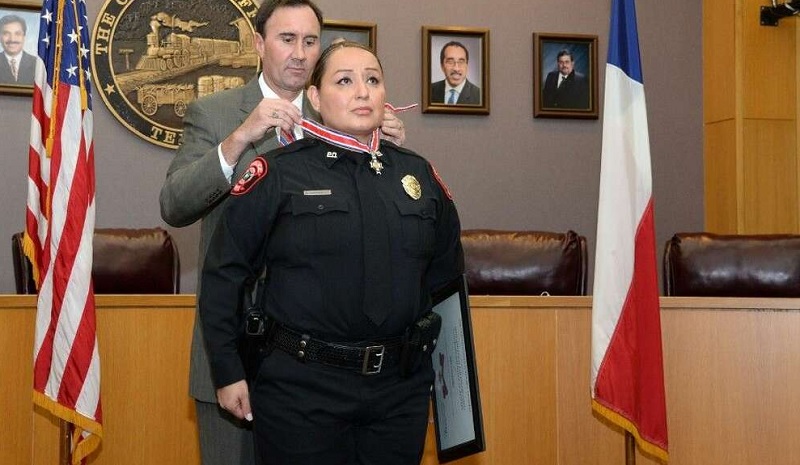
The survival mantra in police training is spoken in several clichés: Your main goal is to go home alive after the shift. You want to take off your own shoes at the end of the day. Be polite to everyone you meet but have a plan to kill them. Better judged by twelve than carried by six.
For critics of police “warrior” training, this kind of indoctrination is said to produce paranoid and unnecessarily aggressive police officers. Trainers simply know that police officers will inevitably face potentially deadly threats and must face the reality that their survival from day to day is not guaranteed.
“On October 26, 2013, Officer Anna Carrizales approached a suspicious vehicle occupied by three males that was stopped at a green light in a moving lane of traffic in Stafford, Texas. As she approached the vehicle and began speaking to the driver, the male in the front passenger seat pulled out a gun and shot her twice—once in the face and once in the chest. The gunshot to her face ricochet off her cheek bone, exited her cheek, and almost severed her ear lobe. The gunshot to her chest was stopped by her bulletproof vest but was fired at such a close range that it punctured a hole in her left breast. The suspects then fled in the vehicle.
Despite the horrific assault and serious wounds, Officer Carrizales had the presence of mind to fire four shots at the fleeing suspects. She then returned to her patrol car and pursued the suspects, all the while giving clear information to the dispatcher about her condition, the suspect’s direction of travel, and situational awareness for responding officers. The pursuit ended at an apartment complex in Houston, where the three suspects abandoned their vehicle. Officer Carrizales was right behind them.
Officer Carrizales’ incredible bravery and concern for her community drove her to lead fellow officers to the suspects. She assisted in the arrest of one of the suspects—the shooter—in the apartment complex that morning. The remaining two were arrested within 48 hours.” So reads the 2013 citation for the Congressional Badge of Bravery.
Officer Carrizales’ desire to stay alive would have been best served by returning to the relative safety of her patrol car and waiting for assisting officers and paramedics. Common sense and self-preservation says that would have been the natural and logical thing to do. But self-preservation is not what officer survival is all about. Carrizales continues to work as a police officer and trainer, sharing her story to encourage others.
In a chilling dash cam video never released to the public, first responders from Jacksonville, Arkansas on the scene of a crash were intentionally mowed down by Bryce Allen, who is now serving a 70-year prison sentence for the death of a firefighter and the critical injury to Officer Daniel DiMatteo in 2012. Audio from the video recorded the cry of pain as DiMatteo was struck to the pavement by Allen’s speeding vehicle. As the officer lay in the roadway with severe injuries, he continued to command the scene radioing instructions for additional responders to secure the roadway and prevent additional injuries. DiMatteo not only survived but stayed in the fray and continued to serve. Although medically retired as a result of the assault he continues to serve by working with injured officers and veterans in service projects and disaster response.
The illustrations of officer survival are endless. When watching news coverage of disasters, there is always the compelling image of people fleeing while police officers head toward the trouble.
That survival mindset is altruistic rather than self-serving. Staying in the fight, and continuing to serve is the central issue. The badge represents all citizens. The weapons and body of the law enforcement officer are in their service. For an officer to allow harm to themselves is to allow harm to their citizens. To do them the most honor and highest service the officer must survive to continue the work. When the police officer defends themselves they defend thousands.